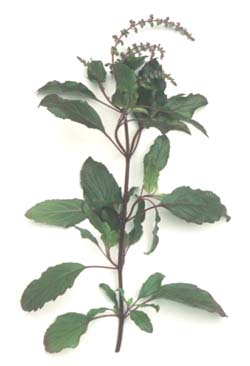Dec 15, 2025
Dec 15, 2025
 Basil falls under the category of herbs. It is a small plant which is branched, erect and two to three feet tall. Leaves are usually green with toothed margins and dotted with minute oil glands. When crushed, leaves give a strong fragrant scent. The flowers are small, usually purplish in slender spiked clusters. It bears tiny fruits and yellow-red seeds.
Basil falls under the category of herbs. It is a small plant which is branched, erect and two to three feet tall. Leaves are usually green with toothed margins and dotted with minute oil glands. When crushed, leaves give a strong fragrant scent. The flowers are small, usually purplish in slender spiked clusters. It bears tiny fruits and yellow-red seeds.
15-Dec-2013
More by : Dr. Jaipal Singh